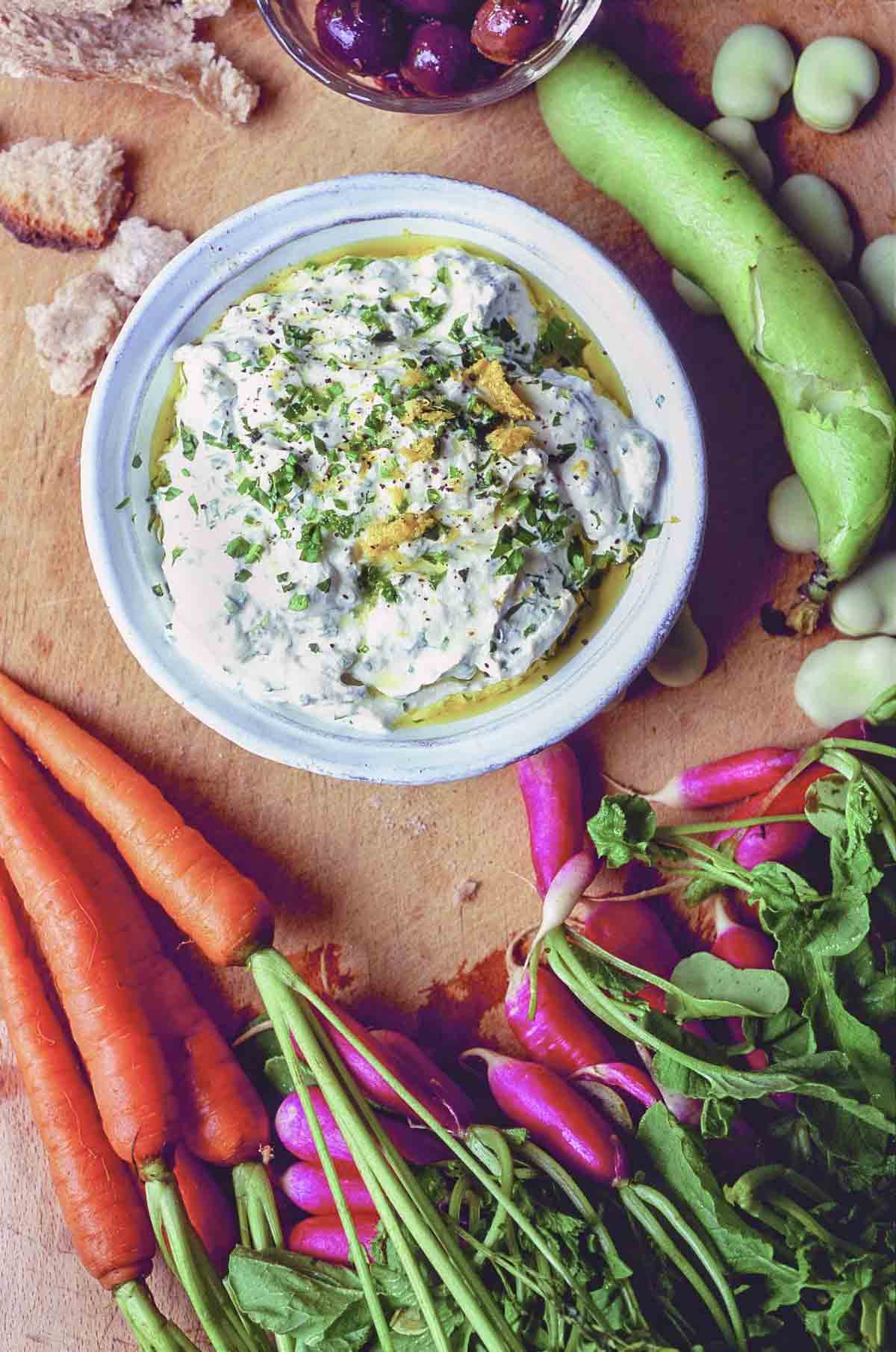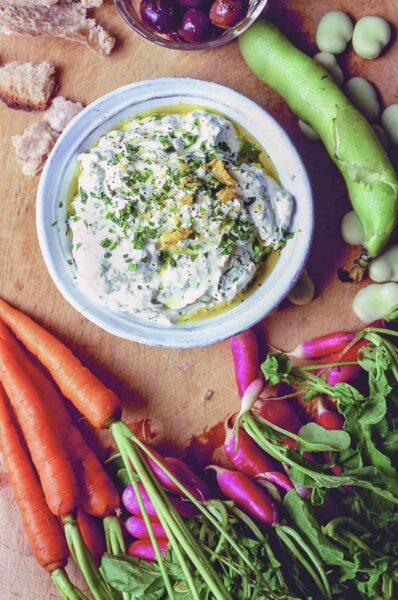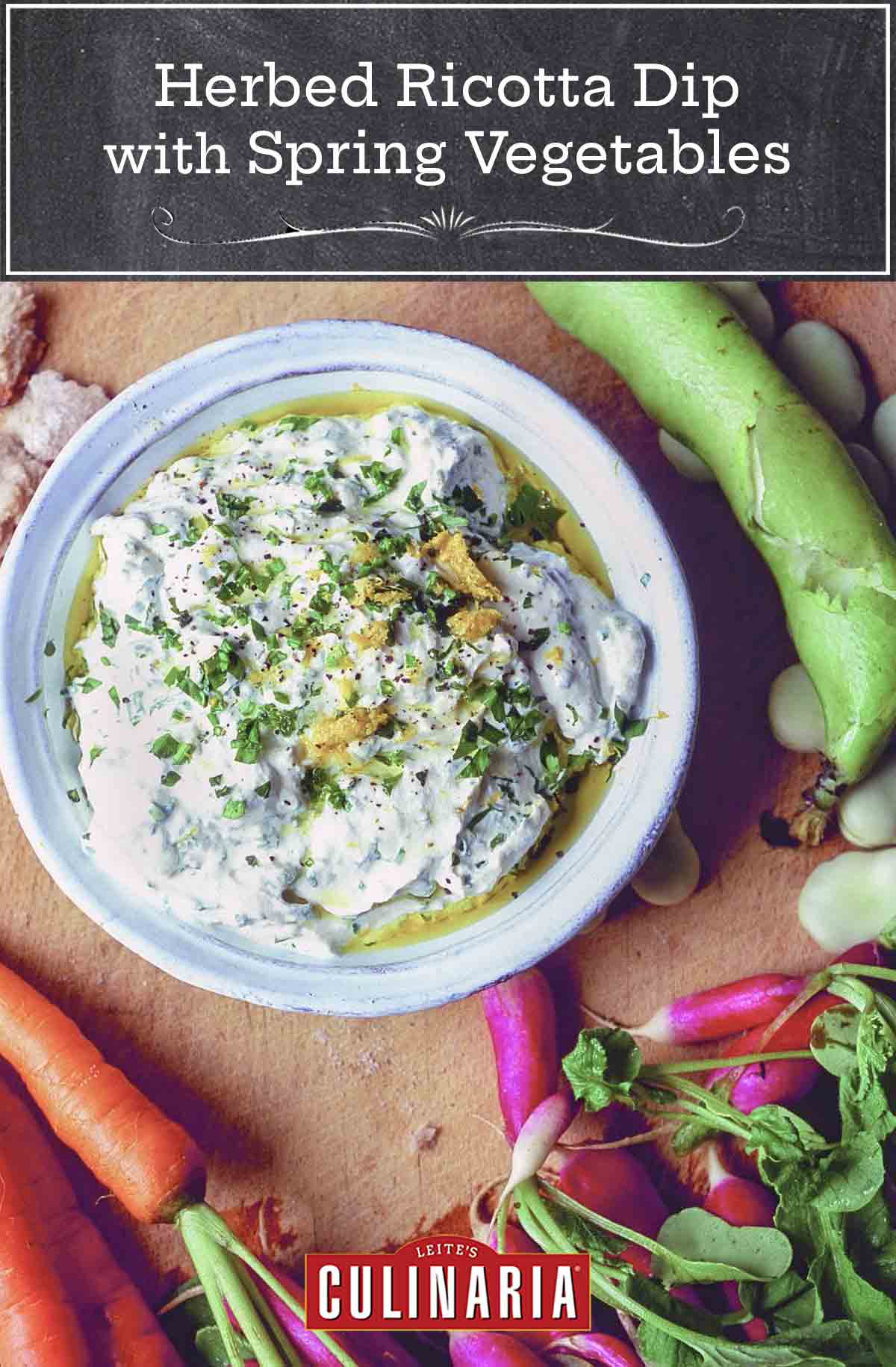
Wondering how to jazz up plain old raw vegetables, whether for a cocktail party or an easily portable lunch at work? Try this combo of dip and dippers. Someone who made this recipe shared with us that it inspired her 5-year-old to eat an entire bag of baby carrots in a single sitting. It just may do the same for veggie-challenged adults in your house. Behold, the power of the dipper!–David Leite
Herbed Ricotta Dip FAQs
To zest citrus properly:
1. Be sure your zester is positioned with the bow or channel facing up.
2. Now, with your other hand, grab your lemon, lime, orange, or grapefruit—preferably organic, mind you, to avoid all those contaminants that just don’t belong in a body—and zest away.
3. The bow or channel will collect the grated zest in lofty mounds, and you can easily see what you’re doing and can turn the fruit with nary a pause. The best thing is you can zest the whole fruit in one go.
Watch this video on the proper way to zest citrus for a fantastic tutorial.
Jarred garlic definitely has its appeal–there’s nothing to peel and mince, you just dump a bit into your recipe. It’s a shortcut that has its place in the kitchen, for sure.
But, jarred garlic is canned, a process that takes some of the flavor and fire out of those crushed cloves. If you’re into jarred garlic for the convenience factor (we get it–we really do) consider this: many stores offer already peeled cloves in bags. They’re not going to have the shelf-life that jarred garlic does but they do pack a bit more of that familiar flavor punch, and there’s no peeling involved, just mincing or dicing.
In all honesty, though, especially in recipes where you want that garlic flavor to shine, fresh is best. It’s a bit more work, but it just smells better, it just tastes better, and that subtle raw garlic heat will be more noticeable.

Herbed Ricotta Dip with Spring Vegetables
Ingredients
For the herbed ricotta dip
- 1 pound absolute best-quality fresh ricotta*, (the caliber of this single ingredient will make or break your dip)
- 1 garlic clove, peeled and crushed or grated
- 1 tablespoon snipped chives
- 2 tablespoons finely chopped flat-leaf parsley leaves
- 1 tablespoon finely chopped mint leaves
- 1 lemon, both the grated zest and a good squeeze of lemon
- 3 tablespoons olive oil
- Salt and freshly ground black pepper
For the dippers (a few suggestions, although anything will work!)
- Raw sugar snap peas, topped and tailed
- Raw favas, peeled
- Radishes, whether French breakfast or otherwise, scrubbed
- Baby carrots, scrubbed
- Cherry tomatoes, in any hue
- Black olives
- 1 loaf artisanal bread, such as ciabatta, thinly sliced and, if desired, toasted
Instructions
Make the herbed ricotta dip
- In a bowl, use a fork or the back of a wooden spoon to mash together all of the ingredients. Taste and adjust the seasonings accordingly. Cover and refrigerate just long enough to chill the dip and allow the flavors to meld and no more than a few hours.
Prepare the dippers
- Arrange the vegetables on a cutting board, platter, or individual plates. Cover and refrigerate for up to several hours.
Serve the dip and dippers
- Allow the dip to sit at room temperature for at least 1 hour prior to serving. Set it out alongside the vegetables. And then just sit back and accept accolades.
Notes
*Where To Find Fresh Ricotta
Truly fresh ricotta can sometimes be a little tricky to find but trust us, it’s worth seeking out for this—or any–recipe. You’ll find it at Italian delis, most cheese shops, and some specialty grocery stores. The stuff sold in tubs in the supermarket just doesn’t compare to tangy, sweet-smelling, ever-so-slightly crumbly fresh ricotta.Explore More with AI
Nutrition
Nutrition information is automatically calculated, so should only be used as an approximation.
Recipe Testers’ Reviews
Did you know only 68% of the recipes we test make it onto the site? This recipe survived our rigorous blind testing process by multiple home cooks. It earned the Leite’s Culinaria stamp of approval—and the testers’ reviews below prove it.
This dip will forever live in my mind as the one that convinced my 5-year-old son to eat an entire bag of carrots in one sitting. I love that the vegetables easily can be swapped out to fit people’s likes and dislikes. Make sure to use a high-quality ricotta—it makes a huge difference. Also, don’t leave out the mint; it’s what gives this dip its fresh spring taste. This dip was great on a toasted baguette, and great as a sandwich spread. An easy hors d’oeuvre for Easter.
This ricotta dip does those luscious spring veggies justice! It’s light as air, and isn’t as fattening as the ubiquitous Ranch dressing dips that we’ve all been known to serve with crudite. We amped it up with extra garlic, which I highly recommend if you’re garlic lovers like us. Also, I’d recommend not letting the dip sit for longer than a few hours before service. I thought it would be OK to make the night before, and while it was, I did have to add in more fresh herbs to get a fresher flavor. Be sure to try this out with pears and apples, as well.
Delicious, simple, and fresh. This was a great recipe for a vegetable dip. Finely chopping the herbs and garlic is key, as is serving the dip at room temperature. I’d also suggest using a food processor next time to make this recipe even easier. The recipe yield and number of servings were very generous, and it looked great on a platter with a bountiful array of vegetables.
This recipe is very easy to prepare. It’s versatile enough to be a spring or summer plate for guests, a light dinner for family, or as part of a brunch served with crackers and a nice salad. The lemon zest gave the dip a twist that was a nice change from our usual cheese mixture. We liked it very much!
This recipe is a great opportunity to use that leftover ricotta from pasta dishes or cheesecakes. The mint, lemon zest, and squeeze of juice brings a light, refreshing taste to the dish. Allowing the dip to come to room temperature is an important step, as the flavors heighten as it warms. The same importance should be emphasized for allowing time for the flavors to meld. If your ricotta is a little dry, you can add a couple tablespoons of milk or cream. The dip was particularly tasty against the sharpness of the radishes. I also used red and green bell peppers. I didn’t understand the shelled peas or fava beans as a dipping vegetable—it’s hard to dip a pea. (Maybe the intent is to spread the dip on some toasted bread and then add the beans.) The next time I make this, I’ll add minced olives to the cheese.
I started by making my own ricotta. Once I learned, several years ago, how easy it was to make ricotta from scratch, I never bought it again. After making the cheese, you just mince garlic, snip herbs, zest and squeeze a lemon, add oil, salt and pepper, and stir it all together. I served the dip in a bowl with a generous garnish of the fresh parsley and mint. It was terrific as a spread for crusty bread slices. Any variety of vegetable dippers would work well, though a colorful array nicely complements the green-flecked dip. I’m glad I gambled and made this for a party—it was a big hit! A guest who makes her own yogurt exclaimed how delicious it was.













Hi,
Has anybody made this with shop-bought ricotta? It is the only ricotta we can get where we live here in New Zealand. Will it be worth making with shop-bought ricotta? I found that statement (the caliber of this single ingredient will make or break your dip) quite disheartening.
Christel, my apologies, my intent behind that caveat about the quality of the ricotta was not to dissuade anyone from trying the recipe. Nor do I expect anyone to make homemade ricotta expressly for this recipe. I simply meant to caution folks against using the cheapest brand they can find after it’s been sitting in the fridge for 3 weeks. That’s all. I believe most of our testers used shop-bought ricotta and loved it! Kindly let us know what you think of it!
This is an old question, but YES I sure did and it was still very delicious. My husband’s Italian grandmother used to make dips and spreads out of leftover ricotta and they were all delicious. Use what you have!
Thanks, Groovy Mom!
I’m not too crazy about ricotta, but the homemade is an improvement. In this recipe, the herbs and lemon make the cheese more palatable for me, but I still increased the garlic to three good size cloves and crumbed in some feta. Those little salty hits in there really make it for me. 😉
Couldn’t agree more about those little salty hits, Ruthie. And the additional garlic. They really help to give dips that extra wow factor.